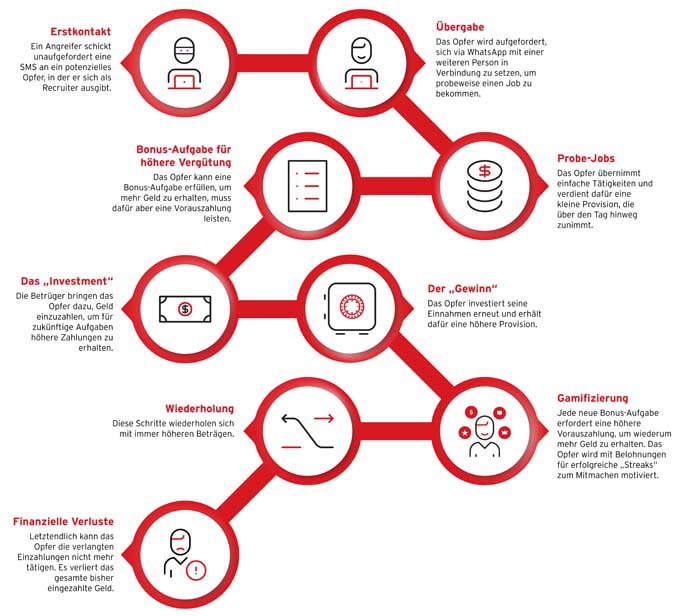Task scams: A form of fraud with strong growth
Recent studies by Trend Micro reveal a global shadow industry with gamified fraud platforms, fake websites and cryptocurrencies. So-called "task scams" are on the rise. These are sophisticated online job scams that lure victims with seemingly harmless digital tasks and systematically deprive them of their money by making ever new financial demands.

Cyber criminals do not stop at job seekers: cybersecurity service provider Trend Micro has uncovered a widespread, global criminal infrastructure that imitates reputable companies, exploits trustworthy communication channels and lures job seekers into traps with gamification elements. Victims take on simple tasks, such as liking and subscribing to social media pages or writing product reviews, which are completed in groups of typically 30 to 40 tasks at a time. Many victims report that they initially receive small commissions to build trust. Subsequently, however, they have to make higher and higher deposits in order to receive supposedly more lucrative commissions. This continues until the victims no longer make any new payments and lose the sums paid in and the supposed wages.
Millions moved in cryptocurrencies
According to security researchers, the perpetrators transfer millions of euros via cryptocurrency wallets, while the victims lose between a few hundred and hundreds of thousands of euros. In one case, a single wallet received payments of over 160,000 euros (187,000 USD) in less than two months. Another wallet was linked to transactions amounting to more than 1 million euros (1.2 million USD).
The report is based on direct interactions with scammers, infrastructure mappings of malicious websites and forensic analyses of associated cryptocurrency wallets and shows the key approaches of the "task scammers":
- Imitation of real companiesincluding recruitment agencies and digital agencies
- Gamified cheating platforms with VIP levelsreward series and incentive systems
- Widespread use of SMSWhatsApp, Telegram and fake websites to create credibility
- Domain registrations via notorious registrar services, with
Hundreds of identified lookalike domains - Cryptocurrency paymentsthat conceal money flows and facilitate international money laundering
Those affected report a high level of emotional stress and behavioral patterns that are reminiscent of gambling addiction. In some cases, task scams are also linked to larger criminal structures involving forced labor in scam operations and human trafficking in Southeast Asia.
More transparent recruitment practices required
"Task scams have become one of the most financially and psychologically damaging cybercrime threats facing individuals today," said Robert McArdle, Director of Forward Looking Threat Research at Trend. "The underlying infrastructure - from domain registrars to SMS delivery services - requires immediate attention. Companies can reduce the risk by being transparent about their recruitment practices and training job seekers on how to recognize legitimate communications."

Such modern fraud methods are highly targeted and designed to remain undetected. In a recent Trend Micro global study of over 6,500 consumers, 39% of respondents said they only realized they had fallen victim to a scam after they had already lost a significant amount of money. To protect against such scams, Trend Micro has developed the apps ScamCheck and Scam Radar developed. This allows users to recognize early on when they are being targeted by fraudsters. Scam Radar provides real-time protection by identifying the scams used by cybercriminals as they happen. Users are warned immediately and can take countermeasures before any damage is done.
Source: Trend Micro









